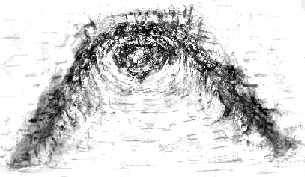

Once there was a spirit-boy
named Winabojo who taught the Ojibway how to live in the natural
world.
One day he asked his grandmother
what was the biggest fish in the lake. She replied that there
was an enormous fish that lived by a rock ledge but it was very
powerful and would harm Winabojo. No one could kill the fish because
no one could get down there where it lived.
Winabojo thought about how
to hunt this fish, so he got some wood to make a bow and arrows.
Then he asked his grandmother if there were any birds whose feathers
could be put on the arrows to make them effective. She told Winabojo
the only feathers strong enough come from a bird that lives in
the sky, at the opening of the clouds. One would have to go there
to get these feathers.
Winabojo climbed to the highest
cliff and discovered a nest of the Thunderbirds and saw their
babies. Winabojo turned into a rabbit so the Thunderbirds would
bring him to their nest for their babies to play with. Winnabojo
stayed in the nest for a long time; the babies were cruel to him
and tossed him around. Eventually Thunderbirds went away to hunt
for more food for their babies. Winabojo turned back to a boy;
he clubbed the baby Thunderbirds and pulled out their feathers
Before their parents could return, Winabojo jumped from the high
nest with the bundle of feathers but he was knocked out, but he
was not killed because he was a manido.
When they returned to their
nest, the angered Thunderbirds flew after Winabojo!! Thunder rolled
from their beaks and lightning flashed from their eyes. Winabojo
ran for his life clutching his bundle of feathers, but soon grew
so tired he began to fear he would be caught. As the Thunderbirds
reached for him with their claws, Winabojo saw an old fallen birch
that was hollow inside. Winabojo crept into the hollow in the
nick of time. The Thunderbirds ended their attack because they
knew they could not reach Winabojo through the birch bark. Winabojo
was safe. After the Thunderbirds went away, Winabojo came out
and proclaimed that the birch tree would forever protect and benefit
the human race.
You can still see the short
marks on the birch tree to made by Winabojo to commemorate the
sharp claws of the Thunderbirds which almost killed him. The Thunderbird
parents put "pictures" of their baby birds with out-stretched
wings into the birch bark so the sacrifice of their children would
always be remembered.
Winabojo fixed his arrows and
went home. With these arrows he was able to kill the great fish
that lived under the rock ledge.
Winabojo has blessed the birch
tree for the good of the human race. And this is why lightning
never strikes the birch tree, and why anything wrapped in the
bark will not decay. Birchbark is useful for house coverings,
canoes, containers, utensils, tinder and in many other ways.
Native Americans traditionally honor the tree by offering a gift,
such as tobacco, when they use this tree.
(adapted from The Legend of
Winabojo and the Birch Tree, in How Indians Use Wild Plants for
Food, Medicine and Crafts, by Frances Densmore. Dover Publications
Inc., New York, 1974).

|
Text and Graphics
© 1994 - Tara Prindle unless otherwise cited. |